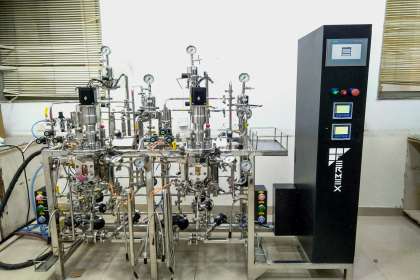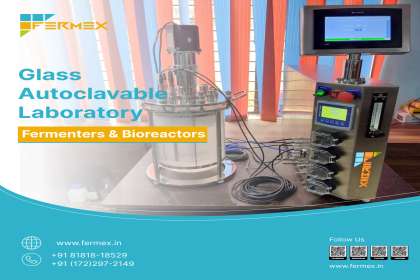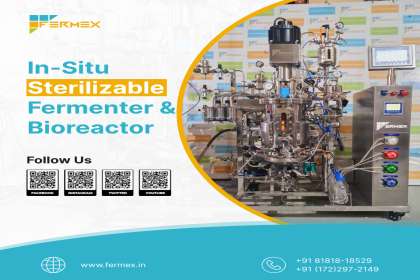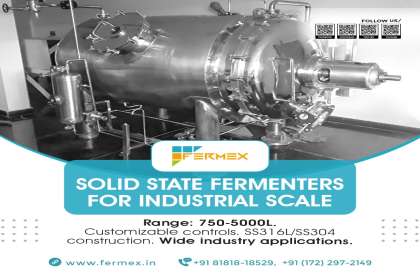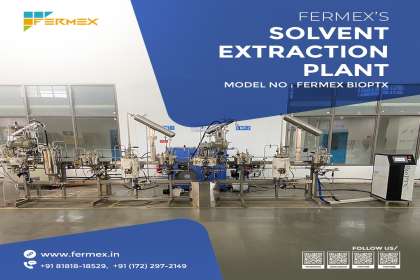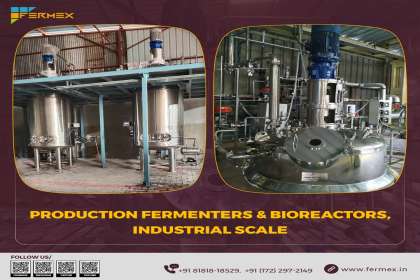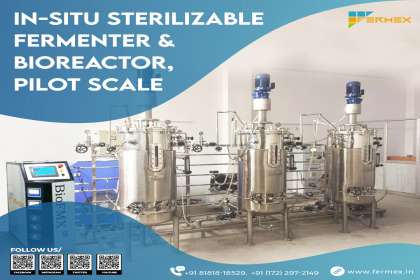Enhancing Bioethanol Production in Fermenters or Bioreactors: A Promising Pathway towards Sustainable Energy

Use Fermenters and Bioreactor in Manufacturing of Bioethanol
Fermenters and bioreactors are integral to the manufacturing of bioethanol, a renewable fuel derived from biomass. These vessels provide a controlled environment for the fermentation process, where microorganisms like yeast convert sugars into ethanol.
- The fermenters maintain optimal conditions of temperature, pH, and nutrient supply to support the growth and activity of the microorganisms, resulting in efficient ethanol production.
- Bioreactors further enhance the process by enabling continuous and large-scale production.
- The use of fermenters and bioreactors ensures consistent ethanol yields, improves process efficiency, and supports the sustainable production of bioethanol as a viable alternative to fossil fuels.
Use of Fermenter or Bioreactor for Bioethanol Production:
- Fermex Solutions LLP Fermenters and bioreactors are key components in the production of bioethanol, providing controlled environments for efficient fermentation processes. These vessels offer precise temperature, pH, and oxygen regulation, optimizing ethanol production.
- They accommodate various feedstock’s and allow for genetic engineering advancements. Fermenters and bioreactors play a vital role in driving bioethanol production, enabling sustainable and scalable solutions for renewable energy.

Key Stages involved in Process of Making Bioethanol
1. Feedstock Selection: The first step is to select a suitable feedstock for bioethanol production. Common feedstocks include sugarcane, corn, wheat, and various cellulosic materials.
2. Pre-treatment: Depending on the feedstock, it may require pre-treatment to break down complex carbohydrates into simpler sugars that can be readily fermented. This can involve processes like milling, grinding, or enzymatic hydrolysis.
3. Fermentation: The pre-treated feedstock is mixed with water and introduced into a fermenter or bioreactor along with a specific strain of yeast. The yeast metabolizes the sugars in the feedstock and converts them into ethanol and carbon dioxide through anaerobic fermentation.
4. Optimization: During fermentation, various parameters such as temperature, pH, nutrient concentration, and oxygen levels need to be carefully controlled to maximize ethanol production. Monitoring and adjusting these conditions ensure optimal growth and activity of the yeast.
5. Distillation: Once fermentation is complete, the resulting mixture contains ethanol, water, and other impurities. Distillation is then employed to separate the ethanol from the mixture. Distillation relies on the different boiling points of ethanol and water to vaporize and condense the ethanol, producing a higher ethanol concentration.
6. Dehydration: To further increase the ethanol concentration, the ethanol obtained from distillation may undergo a dehydration process, such as molecular sieves or azeotropic distillation, to remove any remaining water content.
7. Denaturation (optional): In some cases, bioethanol intended for industrial purposes or fuel may undergo denaturation, which involves adding small amounts of chemicals to make the ethanol undrinkable, thereby avoiding tax issues and preventing misuse.
8. Blending and Storage: The final step involves blending the ethanol with other required additives, if necessary, and storing it in appropriate containers for distribution or further processing.


Fermex Solutions LLP Manufactures Fermenters that can be used for these Production
- Glass Autoclavable Fermenter (Lab scale)
- In situ Submerged Fermenter (Industrial scale)
- In situ Submerged Fermenter (Pilot scale)
Benefits of Fermenters in the Production of Bioethanol:
- Efficient Ethanol Production: Fermenters provide an optimal environment for the fermentation process, allowing the microorganisms to efficiently convert sugars into ethanol. The controlled conditions, such as temperature and pH, promote the growth and activity of the microorganisms, leading to higher ethanol yields.
- Scalability: Fermenters enable large-scale production of bioethanol. They can accommodate a high volume of raw materials and maintain consistent fermentation conditions, making it possible to meet the increasing demand for renewable fuel sources.
- Contamination Control: Fermenters play a crucial role in minimizing the risk of contamination during the fermentation process. The controlled environment and sterile conditions prevent the growth of unwanted microorganisms, ensuring the purity and quality of the bioethanol.
- Versatility in Raw Materials: Fermenters allow for the use of various raw materials in bioethanol production. Whether it is corn, sugarcane, biomass feedstocks, or other agricultural residues, fermenters can efficiently convert the sugars present in these materials into ethanol.
- Sustainability: The use of fermenters in bioethanol production promotes sustainability by utilizing renewable resources. Bioethanol derived from fermenters reduces dependence on fossil fuels, lowers greenhouse gas emissions, and helps in mitigating climate change.
- Process Optimization: Fermenters provide a platform for process optimization. Manufacturers can fine-tune fermentation conditions, such as nutrient supply and oxygen levels, to maximize ethanol production efficiency and minimize byproducts
- Continuous Production: Fermenters can operate continuously, enabling a steady and uninterrupted production process. This continuous mode of operation enhances productivity and efficiency, reducing downtime between batches.








